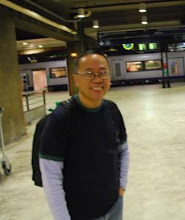The early images of Angeles (early name: Kuliat), came
mostly from the family and descendants of the founders, Don Angel Pantaleon de
Miranda and Rosalia de Jesus. The two earliest santos—San Angelo Custodio (now
enshrined at the Holy Angel Chapel) and Virgen del Rosario (in the central
niche of the Holy Rosary Parish and used in La Naval celebration) date from the
1830.
By 1835, Kuliat had a Pio Quinto (Pius V) , San Juan (St.
John), Sto. Domingo (St. Dominic), Magdalena Mary Magdalene), Nazareno
(Nazarene), Apung Mamacalulu (Lord of the Holy Sepulchre), Manalangiñ (Agony in
the Garden), Bayung Dacap (Arrest of Christ), Macagapus (Scourging at the
Pillar), Desmayadu (Fainted Christ), Macalucluc Batu (Crowning of Thorns),
Tercera Caida (Third Fall) and Sta. Veronica.
In 1836, the Sanchez Family, headed by the matriarch
Fernanda Sanchez, had a processional San Pedro image made. A relative, Casimiro Sanchez, had earlier commissioned the image of Christ
being crowned with thorns.
When Fernanda passed away, the image was bequeathed to
heir Don Lorenzo Sanchez, who used to have a stately residence in front of the
more famous Pamintuan Mansion. It was in his house that future president Manuel
L. Quezon stayed when he attended the first anniversary of the Philippine
Republic in 1899 as member of Aguinaldo’s staff. Designated caretakers were Jose
Galán and Quiteria Espiritu.
Fernanda’s San Pedro, wrought by an anonymous craftsman,
was accompanied by a silver rooster atop a 4-cornered column. The centuries-old
image itself is masterfully carved with head gazing heavenward, with two keys
dangling from his clasped hands. This San Pedro has a wide forehead, with more
luxurious locks and a full beard. The
city’s San Pedro is rarely seen, but participates in the La Naval celebration of
Angeles every October.
ALL PHOTOS COURTESY OF DR. RAYMUND FELICIANO









No comments:
Post a Comment